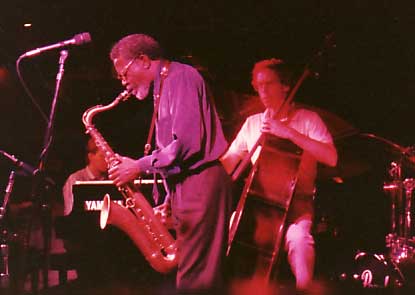Sax Lessons: Joe Henderson

Any sax player who plays the saxophone (yes, I meant to say that) is well familiar with the brilliance that is the legacy of the great, late Joe Henderson. I figured I’d leave the bio to Wikipedia and instead offer you some virtual sax lessons from the master himself.
Years ago Joe gave a performance as well as a masterclass to the lucky students a North Texas State University (which has since been upgraded to “University of North Texas”). Some smart so-and-so recorded the day’s events, and you can even go grab the audio for the master class on David Valdez’ website, over here.
In the sprit of A.D.D., I thought that I’d give you the quick n’ dirty but super-informative and inspiring “Cliff’s Notes.”
Ditch Your Transcription Books
Joe said that the lack of access to fake books and transcription books when he was coming up forced him to gain tremendous skill as a transcriber and memorizer. While the masterclass recording has him saying that he sees the need for books and other educational materials, he also strongly implied that the way he came up was, frankly, kinda better. It got him “closer” to the music than he would have gotten by just plopping down 10 bucks and having someone else do his work for him.
In fact, the sheet music-free approach did Joe so well, that by the time he got to college his teachers thought that he had perfect pitch. Said Joe, “I must’ve transcribed 10 million notes.” The stuff that they were giving him to transcribe in school basically sounded like nursery rhymes compared to the complex bebop that was so deeply rooted in his ears.
Joe added “I didn’t know if I had perfect pitch or not. I just knew an ‘A’ when I heard it. But I knew it from hearing it so much. Is that how you develop perfect pitch, or is that what you call relative pitch, or what?”
No Sheet Music or Tape Recorders Allowed
For his (very fortunate) private students in San Francisco, there was no sheet music in his lessons. Joe’s goal was to raise his saxlings with the same upbringing he had, where according to Joe, “it was me and a record player.”
The way sax lessons with Joe worked was that he’d sit at the piano and feed them around four bars at a time. He played the four bars and they’d play it back, committing it to memory. Then he’d feed them another four bars, and they played that back, and so on and son on. The memorized lines were reviewed at the next week’s lesson, and all of this dictated music was to be stored inside of the student’s brain – nowhere else. Each week’s lesson meant a whole new set of lines to memorize.
The important part was that there was no music notation paper or tape recordings involved in the proces.
Joe touted, “Once you get this brain working for you, you’ll be able to retain…I teach them to practice retention and to retain things.”
Taking things a bit further, Joe even had his students transcribe music live on the spot at clubs. Assuming that the improviser on the bandstand wasn’t playing anything overly complex, Joe would have his students transcribe 12 or so bars as they were played. And the students could actually do it! In this case, Joe would have his tape recorder with him so that he and his students could go back later to listen to the recording and compare it to what was actually jotted down.
According to Joe, “I think that works better on the level that someone can teach you something in a matter of minutes, and you can learn it. They put it down on the music paper for you, and in comes a gush of wind and blows the paper away, and there goes your gig.”
Music Career Advice
Joe also spent a few moments touching on his approach to a career in music. “Being involved in this game out here, bebop, has been pretty good for me. I can’t think of any other way I’d like to exist out here on this planet other than being involved in music one way or another.” (side-note: it’s interesting that he considered his music bebop, huh?)
In listening to the masterclass, it’s clear that Joe’s musical mission was clearly focused on giving back to the jazz world and laying his vast breadth of wisdom and knowledge on future generations of musicians.
Regarding a professional career in music, the tenor champion recommended, “give it a good go, try to have fun at it, try to pass on some good notes and some good sounds to your fans, and I don’t think that you will find that you will have wasted your time.”
Also interesting to note that Joe said he’d rather play 2-3 nights a week, since playing, say, 6 nights a week would result in rapid burnout. “You have to kind of know how to budget your time, your energy, your bread, and all that kind of thing.”
What I’m Taking Home
Besides being one of the leading voices of our time not only on the tenor sax, but in all of music history, Joe Henderson was also a kind, generous, and humble man. My hope is that this interview inspires you to do something new, like maybe give your Charlie Parker Onmibook a rest, or go out and share what you know with some players who’ve been at it for less time than yourself.
So whaddya say, does Joe’s advice ring true to you?






October 28, 2010 @ 9:47 am
Excellent.
My sax teacher in grad school (Steve Duke @ Northern Illinois) told me stories of his lessons with Joe Henderson, and they were just as you parsed from the interview.
I teach my students stuff by ear in every lesson — beginners to advanced. It effects their total musicianship more profoundly than anything else I could assign them.
Thanks a TON for sharing this interview. I find it very inspiring.
all my best,
~ Rick
October 28, 2010 @ 9:55 am
Thanks Rick, SO GLAD that you found it inspiring as that was the goal! Also cool to know that the teaching methods I’ve reported here can be corroborated by others who have first-hand experience with Joe.
I love that you teach your students that way as well. Besides helping their ear, you’re also preparing them for real-world gigs, where unless you’re in a big band or an orchestra, there often is no sheet music. Lucky students!
Thanks again Rick!
Doron
November 16, 2010 @ 11:55 am
Agree 100%. Great post.
November 16, 2010 @ 12:01 pm
Thanks Bob, glad you liked it!
A Guide to Free Online Saxophone Transcriptions | Best. Saxophone. Website. Ever.
December 8, 2010 @ 11:50 pm
[…] folks like Joe Henderson feel that the best way to learn the language of jazz is to learn a solo by ear and mem…, there’s definitely a place for reading transcribed solos, and possibly committing them to […]
Improving My Sax Playing the Fast Way | Best. Saxophone. Website. Ever.
September 8, 2011 @ 6:02 am
[…] Transcription This is basically a subset of ear training which I learned while putting together a summary of a Joe Henderson mater class. In the master class, he shares how when he was coming up, he wouldn’t learn solos by […]
Improving Your Sax Playing the Fast Way | Best. Saxophone. Website. Ever.
September 8, 2011 @ 8:06 am
[…] Transcription This is basically a subset of ear training which I learned while putting together a summary of a Joe Henderson mater class. In the master class, he shares how when he was coming up, he wouldn’t learn solos by […]
January 5, 2012 @ 9:34 pm
I was Joe’a first student in San Francisco, after he moved there. It was before he got onto the system as des robes here, where he taught an improvised solo. He taught some cool scale and. Boreal stuff. But he bugged with students comIng looking for licks and tricks. He was a giant soul and lonh may his music live!
January 5, 2012 @ 11:04 pm
Wow, amazing that you got to study in-person with one of jazz history’s greats! And yes, I can imagine how licks and tricks were far beneath what he had to offer students.
Thanks for sharing, Bob!
January 6, 2012 @ 9:43 am
I must apologize for the errors in my previous post….
it was late, the keyboard was small…..sorry…
To repeat, in English this time…I was Joe’s first student in San Francisco, after he moved there. It was before he got onto the system as described here, where he taught an improvised solo. He taught some cool scale and chordal stuff. But he got bugged with students coming looking for licks and tricks. He was a giant soul and long may his music live!
It was always a great hang with Joe, he asked me to help him with several projects that were amazing to be a part of.
January 6, 2012 @ 9:43 am
I must apologize for the errors in my previous post….
it was late, the keyboard was small, it was late…..sorry…
To repeat, in English this time…I was Joe’s first student in San Francisco, after he moved there. It was before he got onto the system as described here, where he taught an improvised solo. He taught some cool scale and chordal stuff. But he got bugged with students coming looking for licks and tricks. He was a giant soul and long may his music live!
It was always a great hang with Joe, he asked me to help him with several projects that were amazing to be a part of.
January 6, 2012 @ 7:49 pm
Haha, I figured there was some auto-correct issue going on, but I got the basic gist of what you were saying. Seems like he had his students on a pretty intense regiment with all of that heavy-duty ear training stuff.
January 26, 2012 @ 3:26 pm
That was the best article ever. I had a listen to the recordings as well. Can’t wait to grab the horn.
January 26, 2012 @ 9:42 pm
Very coo Nemoy, so glad you found it helpful and inspiring!
A Guide to Free Online Saxophone Transcriptions » Best. Saxophone. Website. Ever.
May 14, 2023 @ 8:58 am
[…] folks like Joe Henderson feel that the best way to learn the language of jazz is to learn a solo by ear and mem…, there’s definitely a place for reading transcribed solos, and possibly committing them to […]